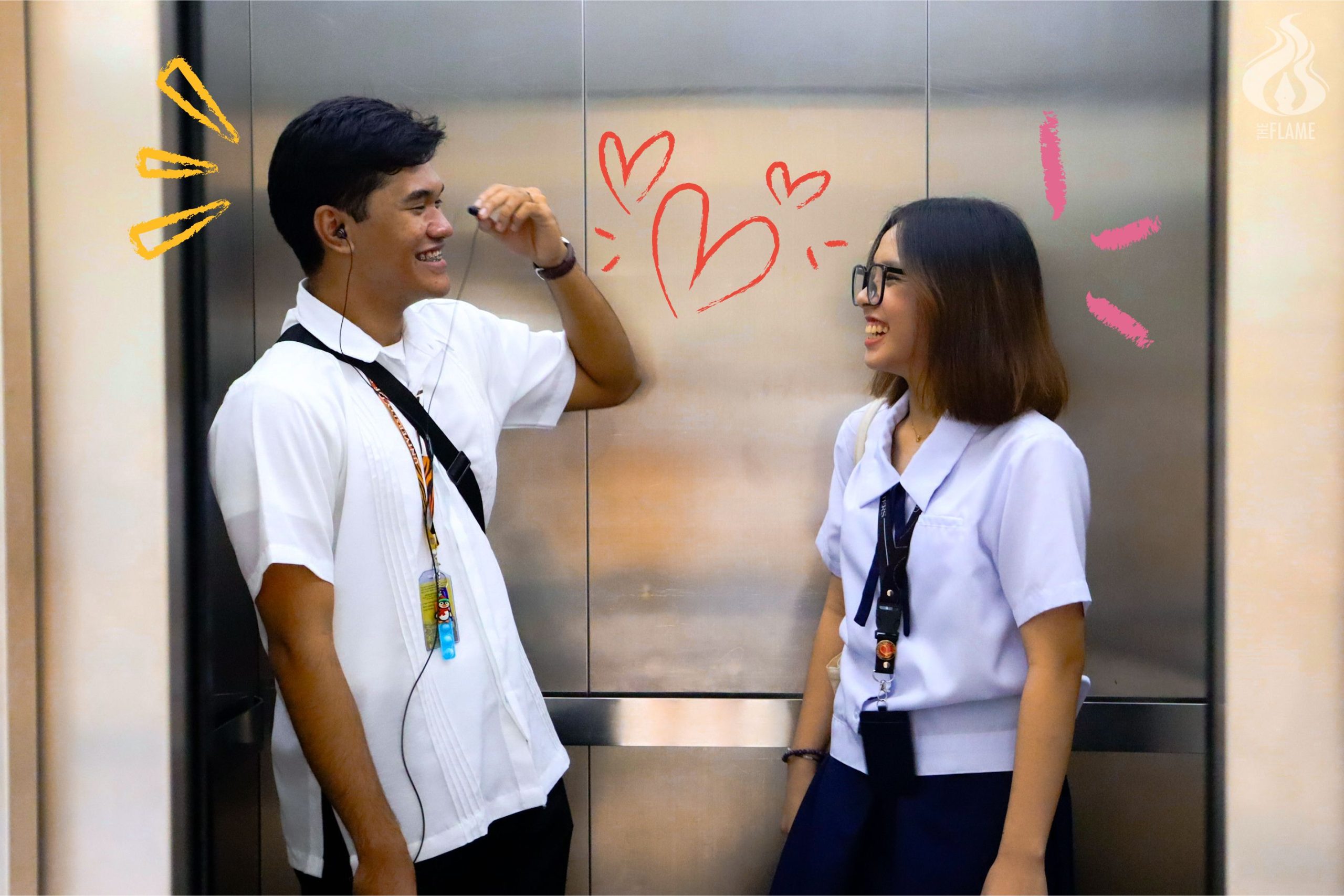
WITHIN THE four walls of a classroom, the only counterpoint to a ticking clock and scratching pens during a boring class is a classmate holding the same allure as the golden sunlight streaming through the windows.
The shared desks and study sessions can become a fertile ground, not just for the expansion of knowledge but also the blossoming of love.
Classmates turned lovers whisper between notes and fill the corridor with waves of laughter, hoping and praying that their feelings will remain the same in good times and in bad, in sickness and in health. But sometimes, these intimate spaces can transform into battlegrounds of awkward exes and murky waters of post-breakup professionalism.
Kaydee and her partner for nearly four years managed to prevent such a scenario from happening. The classroom provided a support system for their flourishing love and academic camaraderie as political science students.
In contrast, Eli, a communication student, ended his longtime relationship with his classmate although they continue to treat each other with respect and professionalism.
Whether it is a recipe for disaster or a sweet victory, depending on their rapport and their end, the line between heaven and hell is often just an armchair away.
Defining ‘blockcest’
A unique blend of proximity with each other, a set social circle and mandated meetings fuel classmate relationships, colloquially called “blockcest.”
It is not a new phenomenon born of modern academia but a thread from generations of blushing classmates and stolen glances behind books. The stage frequently changes, but the script of such a romance remains the same.
Students often find themselves drawn to one another within the confines of their class sections, although creating ties may also be motivated by the need to cope with the academic work load. But what begins and ignites the spark of romance within these academic boundaries are subjected to many nuances.
For Joseph de Roxas, a clinical psychologist and a former UST behavioral science faculty member, the answer may lie in several psychological phenomena that thrive in the classroom. He highlighted the roles of proximity effect, familiarity effect, and propinquity effect in fostering attraction and intimacy among classmates.
Simply put, the proximity effect is being physically close to someone who makes you like them more. It is like two magnets drawn together by the invisible force of shared deadlines and whispered jokes.
Then there is the familiarity effect, which stays true to the saying, “The more you see something, the more you like it.” The sound of that classmate’s sigh before a difficult exam, their muffled giggle when they stuttered in reporting, and any repeated exposure, even if initially neutral, can increase positive feelings towards them.
Combining the two, a sense of closeness and attraction develops, which de Roxas referred to as the propinquity effect. This makes it more likely for classmates to see each other in a romantic light regardless of the moment and situation.
The potential for romantic connections blossoms in a familiar and even home-like space. But de Roxas noted that these phenomena are not exclusive to these closed quarters. They can also manifest in workplaces, apartment buildings, and other settings where regular interactions occur.
Attitude matters
Mindset matters for Kaydee when starting and sustaining a relationship with someone from the same section.
Having the same class schedule every term, Kaydee and her partner followed the same routine and shared the same academic struggles. They have recuperated and recovered from studying through shared practices.
“[Being in the same block] gave us a lot of common ground to talk about, such as our subjects and courses taken. We also gained a lot of common friends,” she said.
There will always be negative preconceptions about dating a blockmate, but Kaydee claimed that “attitude determines one’s future.”
However, such a set-up makes things awkward for Eli and his former partner, who is still his classmate. They find themselves in “uncomfortable situations,” particularly for having no choice but to be in one bubble as members of the same class.
“We used to do almost all pair works together, but now we don’t. We are still thesis partners though, and things are professional so far, but there is a hint of passive-aggressiveness from her side,” he said.
For some time during their relationship, being together in a class was a blessing for their romance. It made setting up romantic dates and initiating small talks about school-related matters easier.
Yet, having no time apart made it difficult for the former couple. The demands of academic requirements and social happenings took a toll on them, making the situation heavy.
“For a time, (my relationship with my partner,ñ) worked. There was no need to meet up for activities you want to do with your partner since you’re with them in class,“ he said.
“(However), having time apart is really important with people you love… an abundance of sentiment or interest in a person can be why you start to dislike them.”
Despite claiming that he and his former lover are “very loosely on good terms,” Eli still holds on to his view that dating a blockmate is not necessarily bad.
“Coming from me who also lasted two or so years with her, even though we are in the same class, (dating a blockmate) is not bad at all… (but) having time apart is really important with people you love,” he said.
Blockmate ever after?
A romantic relationship with a blockmate is like walking a tightrope between convenience and intensity. It exists in a double-edged sword situation where its good factors may create resentment and suffocation.
De Roxas pointed out that there are nuances about whether having a romantic relationship with a blockmate works, depending on the circumstances.
“It is on a case-to-case basis. It is possible (to work) as long as it helps you to perform well in your academics and improve your overall life… make them your inspiration to be better,” the clinical psychologist said.
As navigating through a romance with a blockmate requires emotional intelligence, he warned against neglecting academics for romance. De Roxas reminded students that “love takes time” and that it should not overshadow educational goals. He recommended pacing oneself by building “psychological walls” and seeking professional help.
“Healing takes time… take it one step at a time and seek psychological help when it becomes too much,” de Roxas said.
Eli discouraged fellow students from picking their partners as groupmates in school works. The romantic and the professional aspects must be separated within a classroom context, he said.
“Learn boundaries with them and talk about how to stifle public displays of affection when in class,” Eli said.
But for Kaydee, a leap of faith is sometimes needed: “Trust your gut. If you feel that person is right for you, whether he is a classmate or (a fellow member in an organization), what have you got to lose? Don’t deprive yourself of happiness.” F



